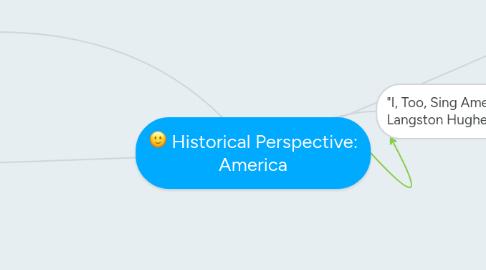Historical Perspective: America
por Allison Antonucci


1. For example, "I hear America singing, the varied carols I hear, Those of mechanics, each one singing his as it should be blithe and strong each singing what belongs to him or her and to none else..." (Whitman, 1-9)
2. Throughout the piece "I Hear America Singing," and "I Too Sing America," there are many similarities and differences. One similarity would be of how they both display about how America was related towards the two poems. However, there are many different points of view and different stories to it. For example, in "I Hear America Singing," there is joy and happiness in the poem, making the reader inspired by what the text says. It explains how people have good opportunities in America. In "I, Too, Sing America," it doesn't show as much joy and happiness. Instead, it shows lots of serious details and makes the mood sad, from here making the reader sad. It explains how some people wouldn't have all the opportunity for being in America, and don't always get what they need or what. However, through the narrator's word choice, we see that he is determined to make his "America" present for everyone to see.
3. "I Hear America Singing" by Walt Whitman
3.1. Tone
3.1.1. Happt
3.1.1.1. For example, "The day what belongs to the day—at night the party of young fellows, robust, friendly." (Whitman, 10)
3.2. Mood
3.2.1. Inspired
3.2.1.1. For example, "The day what belongs to the day—at night the party of young fellows, robust, friendly." (Whitman, 10)
3.3. Who is considered part of this America?
3.3.1. People who are privileged.
4. "I, Too, Sing America" by Langston Hughes
4.1. Tone
4.1.1. Serious
4.1.1.1. "I, too, sing America / I am the darker brother" (Hughes 1-2)
4.2. Mood
4.2.1. Determind
4.2.1.1. "They’ll see how beautiful I am / And be ashamed" (Hughes 16-17).
4.3. Who is considered a part of this America?
4.3.1. The unprivileged people.
4.3.1.1. For example, "They send me to eat in the kitchen / When company comes" (Hughes 3-4).

